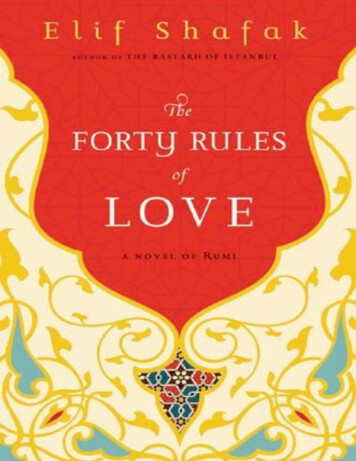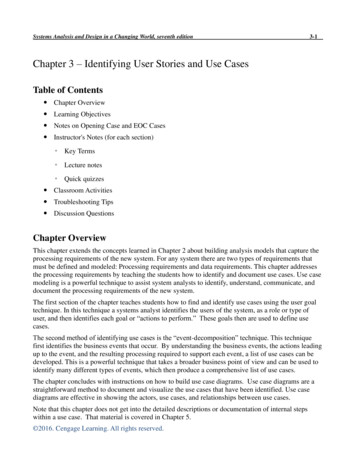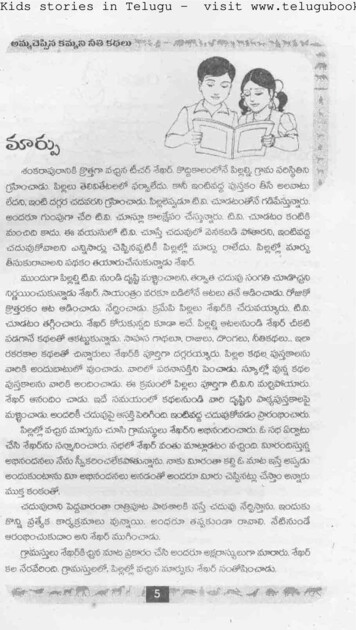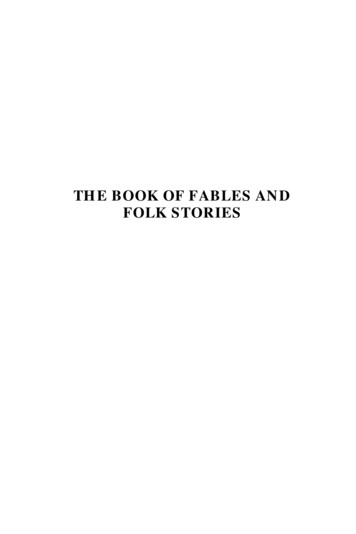
Transcription
FORTY MISSIONARY STORIESCollected by M. Eggleston1934CONTENTSPREFACE1. THE STREAK OF RED2. WE WILL GO3. FOR THE HONOR OF THE SCHOOL4. WE KNOW HIM5. THE LITTLE RED BOOK6. THE MAN WHO MISSED THE COLLECTION7. CHIKKI'S QUEER DESIRE8. UNDER THE ELM TREE9. WHEN THE LIGHT CAME10. FOLLOWING CHRIST11. ONE DAY AT A TIME12. THEIR TREASURE13. BABU'S GIFT14. BIG BILL15. THOSE ABSURD MISSIONARIES16. TRANSFORMED BY A PICTURE17. THE GIRL WHO CHANGED HER MIND18. TOMI'S PRAYER19. WHAT CAN I Do?20. MAHMOUD'S VICTORY
Forty Missionary Stories21. HIS MOTHER'S BOOK22. A BOY WHO WAS WANTED23. THE COST OF A LIFE24. TOO BUSY TO HELP25. THOSE POPPY SEEDS26. MISS LOU'S BABY27. PANDITA RAMABAI, THE FRIEND OF THE CHILD WIDOWS28. THE MAKING OF A MISSIONARY29. THE FRIEND OF THE OUTCASTE30. WHEN THE BANDIT CHIEF PAID A DEBT31. JIMMIE'S RESOLUTION32. HER ONE REQUEST33. ALEXANDER'S CHALLENGE34. AS FOR ME AND MY HOUSE35. MARCUS36. A STRING OF IVORIES37. A GIFT THAT COUNTED38. ROSEBUD39. A LITTLE CHILD SHALL LEAD THEM40. THE LITTLE BLACK HEN THAT BECAME A MISSIONARYCONTENTS BY COUNTRIESCHINA AND KOREAThe Little Black Hen That Became a MissionaryThose Poppy SeedsWhen the Bandit Chief Paid a DebtWe Know HimThe Cost of a LifeA Boy Who Was WantedWhat Can I Do?JAPANFollowing ChristFor the Honor of the SchoolTransformed by a PictureTomi's PrayerThose Absurd Missionarieswww.temkit.com 2
Forty Missionary StoriesINDIAMarcusPandita RamabaiAs for Me and My HouseThe Friend of the OutcasteBabu's GiftThe Girl Who Changed Her MindChikki’s Queer DesireA Gift That CountedAFRICAMiss Lou's BabyWe Will GoWhen the Light CameA Little Child Shall Lead ThemTURKEY, SYRIA, AND ARMENIATheir TreasureThe Little Red BookMahmoud's VictoryToo Busy to HelpJimmie's ResolutionSOUTH AMERICAHis Mother's BookEGYPTA String of IvoriesMISSION TO LEPERSThe Man Who Missed the CollectionOne Day at a TimeIN AMERICAMaine Seacoast Mission—RosebudGrenfell Mission—Alexander's ChallengeAlaska—Her One RequestIndian—The Streak of RedNegro—Under the Elm Treewww.temkit.com 3
Forty Missionary StoriesCity Missions—The Making of a MissionaryRural Missions—Big BillSTORIES FOR SMALLER CHILDRENRosebudA Little Child Shall Lead ThemThe Little Black Hen That Became a MissionaryPREFACENO ONE is heroic all the time; all would like to be heroic in some way at some time. Weusually care little to study the lives of those who, when they heard the call to noblerliving, or saw a vision of service to others, were too selfish, or too lazy, or too indifferentto choose the way of self-control and sacrifice for the sake of others. Rather, we seek tofind stories of those whose lives can be a challenge and an inspiration.These are stories of decisions made by missionaries or by their native Christian helpers;by young people and children; by men and women who dared to trust and obey. Theseare stories which tell of physical, mental, and spiritual bravery on the part of those who,for the time, at least, chose to "climb the High Way" while those about them often"groped the Low." They are true stories of people who have shown by their lives thatChristianity is a Way of Life which gives to those who sincerely follow it great happinessand great opportunity.I am indebted to the Church School Journal for permission to retell, "The Friend of theOutcaste" ; to the Missionary Herald for material used in "Marcus," "What Can I Do?"and "Transformed by a Picture" ; to the Mission to Lepers for "The Man Who Missed theCollection"; to Scribners' for "Those Absurd Missionaries"; and to the American Board ofthe Congregational Church for the use of many letters and reports sent to them fromthe foreign field, and for the photographs used in making the jacket of this book. Theletters and reports form the background of several of the stories. Some of the tales havecome to me from missionaries themselves. To each and all who have helped, I amgrateful.1934 Hyde Park, Mass.MARGARET EGGLESTON OWEN1: THE STREAK OF REDBEFORE the tepee of old Long Foot, the Indian brave, sat Deep River, his squaw, weavinga blanket.Her face was brown and wrinkled, but it was full of strength and purpose and spiritualbeauty. Long Foot and Deep River had both been Christians for many years, and theyhad tried to be loyal to their faith. For nearly thirty years Deep River had wovenwww.temkit.com 4
Forty Missionary Storiesblankets—beautiful ones that people came from far to see and to buy. She was knownall over the countryside, not only for her ability eave, but also for the intricacy of thedesigns which she wove into her blankets. She had made many of different shapes andsizes, but the one before her was the finest of them all.On a stool beside her sat her granddaughter, Lena Beartracks, a tall, intelligent girl offifteen, a favorite in the tribe. Once Deep River had had four granddaughters, but theprairie fire had taken the other three, and had left her the tiny baby to love and to tend.It was the old squaw who had dipped her into the icy spring that she might strong; whohad hunted far and wide for a rare herb that she might put a bit of it into the baby'smouth to give her a chance to be wise. She had taught the child to weave, and to makerare baskets; to cook and to sew; to read and to pray; and she loved her better than lifeitself.During the last weeks Lena Beartracks had often sat on the stool by her grandmother'sside, for every line and color, used in the blanket was to be a symbol of some event inthe life of the tribe, or the grandmother, or the girl. The yellow in the center ran aboutlike the prairie fire; blue on the edges told stories of the long walks they had takentogether; the cross on each side represented their Christian faith. As they sat together,the grandmother told her stories of the events which were symbolized the pattern.In the corner of the blanket, which was just being completed, there was a streak of red,red wool. It was very beautiful, and the girl liked to look at it."When the blanket is done and I give it to you, I will tell you what it means," said the oldsquaw. "Just now it must be a secret here," and she pointed to her heart.On that bright summer's day the old grandmother made her hands fly as she wove inthe last strands of the border of the blanket. Word had come that the missionary was onhis way back to the School for Indian Girls, many miles away. When he reached theirvillage, Lena Bear tracks was to go with him to that school. She had finished the schoolon the Reservation, and, because of her ability to learn and to lead, she was to be givenmore training. As they sat together, the old squaw was silent and thoughtful; the girlwas dreaming of the new life that lay just ahead. Usually the old grandmother hummeda tune as she wove. Now she sighed and looked troubled.What would become of the girl when she was alone so far away? It was not right toexpect one so young to know how to live alone. Why did she need to go when the oldsquaw wanted to be near to guide her? She watched the girl longingly as she rose fromthe stool and hurried down the little street to put more things into, the box which wasto go with her to the new school. Yes, Deep River loved her better than her own life.Just as the, sun went down, the old squaw reached for her knife and cut the blanketfrom its frame. Then she sat down in the twilight and ran her fingers over one andanother of the figures which she had woven into it. How lovely they were! She had donewww.temkit.com 5
Forty Missionary Storiesher very best work, hoping that the blanket would be a treasure for Lena to cherish aslong as she lived. Would it remind her of the love of her grandmother when she was nolonger living in the tepee near the spring? Finally her hand rested on the streak of red."She must," cried the old squaw as she rose to her feet—"she must, no matter how hardit is. I must help her before she goes. I will ask our God to show me the way." So, thereby the tepee, the old squaw knelt on the new blanket and prayed for wisdom and forcourage.The next day Lena Beartracks, in her new dress and hat, stood before the door of thetepee, waiting to say goodbye. Her face shone with happiness as she waited for hergrandmother to come out. It was wonderful to go to the Mission School where shecould learn to help her race. Looking up, she saw her grandmother with the new blanketon her arm."Sit here," said Deep River, slowly, pointing to the bench where they had so often talkedtogether. "Tell me, little one, what this means—and this and this," and she pointed todifferent parts of the blanket. The girl laughed merrily as the old squaw tried to findsome symbol which she did not know."Oh! the streak of beautiful red!" said the girl. "Now that the blanket is to go to schoolwith me to use on my own bed, you must tell me what it means. I have waited long toknow. Tell me quickly, grandmother.""I will show you," answered the old squaw. Taking a sharp knife, she quickly cut a deepgash in her arm, and the red blood ran in a little stream down the brown, arm. The girlstarted forward to help her, but the grandmother pushed her aside."See," she said, putting her arm close to the red the blanket. "This red is for blood. Allthe years of life there have been hard things—hunger, thirst, fire, anger, death, hate—totry to make me forget that I belong to a tribe of strong men and women. Even to theshedding of blood, my tribe has always stood for right. Like this, I, too, have tried tostand," and the old squaw sprang quickly to her feet, winding a cloth about her arm asdid so. She threw back her head, put her right foot more firmly on the ground with alittle stamp, and wrapped the new blanket about her, throwing the corner over shoulderin such a way that the red streak ran from head to her heart. She was a picture ofstrength and courage as she stood there, and the girl loved her."I have stood, granddaughter, unafraid. Though I have to lose my life by the shedding ofblood, I shall still stand for God, and for what I think is right."Suddenly the broad shoulders drooped. She had heard the sound of wheels. LenaBeartracks was going away.Taking the blanket from her own shoulders, she wound it lovingly about the girl whomshe loved better than life itself, throwing the blanket over her shoulder so that, again,www.temkit.com 6
Forty Missionary Storiesthe streak of red ran from head to heart. Turning the face of the girl up to hers, she said,almost fiercely:"You are a part of me—of my tribe—of my race. You too, must stand. You must never bea coward—never run because a thing is hard. Show me how you will stand when I amnot there to help you."Just as the grandmother had done, the girl threw back her pretty head, straightened hershoulders, stamped her right foot on the ground, and looked the grandmother squarelyin the face."I will try to stand when things are hard, just as I have seen you stand," she said, as shepointed with her finger to the red streak."Do not say, 'I will try.'" cried the squaw. "Say, ‘I WILL STAND!' I cannot let you go awayunless I know that you will be brave and true. My blanket, with its streak of red, willhelp you, child."The girl's face grew suddenly very sober—she saw clearly now that it was a great step totake, when she left the tepee of the one who had loved her so well and who had helpedher so much, to go away alone. Her hand gripped the beautiful blanket as she said, veryslowly:"Grandmother, God helping me, I WILL STAND."For a moment the old squaw held her very close. It seemed the hardest thing she hadever done to let her grandchild go into the big, unknown world. Then she took theblanket from Lena's shoulders, wrapped it carefully, and handed it back to her."You are the light of my eyes—the sun of my life, child," she said. "Goodbye. May Godgo with you and help you to stand." Then the old squaw went wearily into the tent,while the girl climbed quickly into the wagon where the missionary sat waiting to takeher to school.Lena Beartracks never saw her grandmother again, but the blanket, though used formany years, still shows the skill and the care of its maker. Some of its colors have faded,but the red, red streak is still bright and beautiful.The home in which the blanket has been used has been one with little money, but onewhere there have been great ideals. Poverty, sickness, temptation, injustice, greed, anddeath have all beat against its door, but Lena Beartracks has stood—a strong student, agood wife, a great mother, a real Christian.2. WE WILL GOwww.temkit.com 7
Forty Missionary StoriesINANDA SEMINARY, a Mission School near Durban in Africa, had a guest whom they alldelighted to honor. She was the granddaughter of Daniel Lindley, the founder of theMission nearly seventy-five years before. He had been a pioneer missionary, gatheringhis groups of uneducated black people under the great trees or in rude thatched huts toteach them, and his granddaughter was very proud of the results of his work as she sawthem in that well-known school in Africa.One morning while she was there, she was wakened by the singing of the girls of theschool, who had already begun their housework about the buildings. It sound so happyand so spontaneous that the visitor hurried to dress and go out to talk with the girls, andto enjoy the view of mountain and valley spread out before her.To her surprise, when she opened the door of her room she saw weeping girls instead ofsinging girls. They were sitting on the steps of the house of a teacher not far away, andthey looked forlorn indeed. Their clothing and their general appearance showed thatthey were not girls of the school."What is the matter?" asked the visitor. "Can I help?"I don't think so," said a teacher, hurrying up to say good morning to the guest. "Thesethree girls have walked a long way to get here, but I have had to tell them that theycannot stay because there is no room.""Oh, what a pity!" said the visitor. "Isn't there some place to tuck them in?""We have no money with which to feed the girls, even if we had a place where theycould sleep," was the answer. "It seems as if some way ought to be found," said thevisitor, thoughtfully."We shall see what we can do after prayers," answered the teacher, motioning to thethree girls to follow her.Soon the schoolgirls began assembling for chapel, and the visitor looked at the happygroup as they passed her, thinking of the squalor and degradation from which they hadcome to this school of her grandfather's. She had seen it all too plainly on her tripthrough the country as she had come to the school. She thought of the overcrowdedkraal homes, the lack of sanitary conditions, the prevalence of animals everywhere; thelack of anything, in fact, to bring out the character and the personality of a girl, Then shelooked at their shining faces, their clean clothing, their eagerness to be of service. Shelistened to them sing the songs of the church, and she wished her grandfather could seeand hear it all.After the service of worship was over, Mrs. Edwards, the teacher, rose and said:"Girls, three more students have come from the villages far away this morning. Theywant to stay at Inanda. They want an education. It is a problem that I do not know howto solve. We have no more room, and we have no more money with which to feed andwww.temkit.com 8
Forty Missionary Storiescare for more girls. I have told them that they must go home, but they have beenbegging me to keep them. It is many long miles back to their homes, and they are verytired. What shall we do about it? Tell me what you think."There was a buzz of conversation as the girls talked it over among themselves. Theywould all be willing to have less to eat, themselves, if the girls could stay. Maybe theycould find places for them in some building. To question, "Shall we send them back?"there was a ready "No." Yet how could they stay?"Our visitor thinks they should stay," said the teacher, "but I see only one way in whichit can be done. Are there three girls who have been here a long time, and who hareceived the Light of Christ in their hearts, who will give up their places to these threenew girls? Are there three who will go home and let these girls stay?"A frightened look came over the faces in the group. Go home! Leave Inanda! How couldthey? One by the girls filed out, and no one offered to go."Do you think any girl would be willing to sacrifice her school and her happiness to givea stranger her place? That is a great deal to ask," questioned the visitor, as she joinedthe teacher."We shall see," replied the teacher. "It is the only way that the new girls can stay, Ithink."Only a short time had gone by when three girls, with very sober faces, came to the placewhere the two ladies were sitting."We are willing to go home and let the others have our places if you will let them stay,"said one of the girls."But you have been here only a short time," said the teacher, looking at the youngest ofthe three. "Do you not want to stay in the school?""I love the school, and I want very much to stay," said the little black girl. "But I havereceived the Light of Christ in my heart, and I am willing to go that these other girls maystay here and find it. I will go home and tell those who are there what I have foundhere."So the three Christian girls went to pack up their few things preparatory to going back totheir homes; while the teacher sought out the new girls to tell them that they couldstay."'Tis the spirit of Inanda," thought the visitor. “‘Thou shalt love the Lord thy God with allthy heart, and with all thy mind, and with all thy soul, and thy neighbor as thyself.' It isthe spirit of my dear old grandfather."www.temkit.com 9
Forty Missionary Stories3. FOR THE HONOR OF THE SCHOOL"REMEMBER, boys," said one of the teachers of Doshisha, a well-known Mission Schoolin Japan, as they were getting ready for a short vacation, "the honor of our school doesnot depend upon the beautiful buildings, which we have, nor upon the large number ofstudents who come here. It depends upon everyone who has been, or is, a student here.People judge a school by what they see of its product. You must live right and act right ifyou want to be an honor to the Doshisha."As the boys went from the chapel, they discussed what the man had said and wonderedhow many people really cared what a boy did.Nearly a year later a big group of the Doshisha boys ran into a little eating-house onLake Biwa in Japan. They quickly ordered their food and ate it with much good fun andlaughter. Then they left a pile of coins in the center of each table and hurried away.Soon the woman who was in charge of the room came to clear the tables. She gatheredthe money into her hand and carried it to the till, dropping it in without counting it.After she had finished her work at the tables where the boys had sat, she came to servea man who had been sitting at an adjacent table."That was a jolly bunch of boys," he said. "Who are they?""They are from a Mission School across the mountain," was the reply. "They often run infor a bite to eat.""I saw you drop the money which they left into the drawer without counting it," said theman. "How dare you trust a group of boys like that? Don't they ever cheat you?”"Why, those are Christian boys from the Doshisha," said the woman. "We never botherto count their money, for they do not cheat. We like to have them come here becausewe can trust them."The man was much interested, so he asked her many questions about the MissionSchool, but she could tell him little except that the teachers and students seemeddifferent from other groups that came into the tea-room, and that the school wassupported by Christians in America."I must know more about it," said the man. "A school that can turn out boys with areputation like that is worth studying."So the stranger went to a Christian evangelist in his town to ask about the Doshisha, andas the evangelist explained about the life of Christ on which the ideals and standards ofthe school were based, the man became more and more interested in the Bible, wherethe story of that life was to be found. He bought several books to take with him as hewent to his home, in order that he might study more of the Christian religion. In time hebecame a Christian and a worker in the Japanese churches.www.temkit.com 10
Forty Missionary StoriesThe evangelist, realizing that the actions of the boys had been the cause of the interestof the stranger, sent word to the Doshisha of the incident in the tea-room, and of thecompliment which the woman there had paid to Doshisha boys."You see, boys," said the teacher, when he heard the story, "it is just as I told you. Thereputation of school depends upon the actions of everyone who is, or has been, astudent here. People judge a school by what they see of its product. The boys who ate inthat tea-room were an honor to the school."4. WE KNOW HIMTHE white colporteur, with his bag of tracts and Testaments to give away, or to sell,stopped when he came to the top of the very steep mountain and looked far into thevalleys before him. There lay the little villages that he had come to seek, villages towhich he was sure no white missionary had ever gone. He had long wanted to carry hisGood News to them, and so he was happy as he looked down from the mountain. Backof him lay the valley of the Yangtze with the river running like a silver ribbon through it.Around him were mountains—steep, rough, and many of them unknown to the world.As he rested, he thought of all the multitudes in the great land of China whom he wouldlike to reach for Christ. Then he hurried on down the slope to the villages. He knew howeager the valley people were for news from the outside world, and he felt sure that theywould gladly listen to the story which he had come to tell.It was nearing evening when he came to the first village and asked for a place where hecould cook his supper and spend the night. Soon a crowd began to gather about him,eager to see what a white man would do and how he would eat."Where have you come from and why are you here?" asked one of the men."I come from the villages along the Yangtze," he replied, "and I want to share with yousome Good News that has made my life happy and useful. Gather the people togetherand I will read to you from a wonderful Chinese book."By the time he had eaten his supper a large group people were standing and sittingabout his tiny house.Opening his bag that they might see how many books and pictures he carried there, hechose a New Testament in Chinese and began to read. He read of the birth Jesus; of hislove for little children; of his healing the leper and the epileptic."These were sick people such as you have here in your own town," said the colporteur."Listen to this story," he started to read of the healing of a lame man. As read, henoticed that their faces were full of a new eagerness and that they spoke one toanother. Suddenly interrupted him, saying:www.temkit.com 11
Forty Missionary Stories"We know him. He used to live right here in our town. He healed the sick and the lamehere, too. He came to us from England.""That could not be," said the colporteur. "This man did not live in England. He lived inSyria; he was never away from his own country, which is very far from here.""You are wrong," they said, all trying to talk at once, "It was many years ago and wewere children, but our older men can tell you all about him. His grave is here. He was agood man. He was kind to anyone who needed him.""No," said the colporteur. "This man, Jesus, was not here. His face was not white like anEnglishman's. It was tanned from the sun like the Arab's.""We do not know our friend's name," said a woman, "but we can show you his graveand the house in which he lived. When the plague came, and all the rest left us, hewould not go. He gave us medicine out of dark bottles and helped us when we weresick. If our babies were born blind, he washed their faces and they could see. My motherhas told me how he put his hands on sick folks and they felt better, just as you werereading in your book.""We can show you a lame man whom he made to walk," added another. "Come andsee, and then you will know that he lived in our village."So the colporteur followed the crowd down the street toward the outskirts of the town."Here is where he lived," said an older man. "I have seen him sitting here in his door,and once he came to help when my mother was sick. He had a kind face, and I liked togo by his house.""And here is his grave," cried a boy."Read what it says and then you will know that we do not lie," said a man. "We knewhim, just as the people say."The white colporteur stepped quietly to the little marker which stood over a singlegrave, not far from the road, and there he read the name of a young English volunteermissionary who had lived in the village and who had died of the plague."I must know more of this man," he said to those who were watching him. "Take me toone of your old, old men.” So they all went together to the home of one of patriarchs ofthe village. The old man listened to the questions of the colporteur, and then said,"We called him ‘Friend,’ for that was the name he gave us when he came. He had justfinished learning to a doctor when he came to China. He wandered along Yangtze fornearly seven hundred miles, looking for place where he wanted to live and work. Oneday he came to us, and here he stayed. He healed those who were sick and lame andblind, if he could. He worked day and night when we had the plague, and then, when wewere better, he died. We have never forgotten him, for he was a good friend; he told uswww.temkit.com 12
Forty Missionary Storieshow to live in a good way. He wanted to stay in our town, so we buried him there in thefield. I should like to know of this man of whom you read, who was like him."So the colporteur told how Jesus came to teach a better way of life, and said that theirgood friend must have been a Christ-man, trying to follow as closely as he could whatJesus had told men to do. He read to them for a long time from the Bible and gave thempart of it, that they might read more of the man who was like their doctor."We know Him already," said an eager listener. "We know what He was like, for He waslike our friend who lived here in our town."5. THE LITTLE RED BOOKIT WAS nothing new for Mariam's uncle to make a gun in his little shop in the mountainvillage of Hassa Beyli in Turkey, but this one was different, and Mariam often came tosee how soon it would be finished. This gun was to belong to a brigand whose home wasin the hills, and Mariam had heard dreadful things about what the brigands did withguns. At last her uncle went away with it, and she waited anxiously for his return thatshe might ask questions. Was the brigand very big? Did he live in a cave? Did he lookvery fierce? Patiently he answered all her questions, when he was home again, and thenhe said:"When I gave him the gun, he said he had nothing with which to pay for it. He shouldhave told me that before I made it for him. I need the money for the gun. When I said hemust pay something, he brought out this little red book and said I could have it. Therewas nothing else to do, so I took the book in payment for my gun. Now you may haveit," said the uncle, handing it to her.Mariam was pleased to own a book of her own. The print was not large; there were nopictures in it; but it was a book, and so she carried it to her house to put it away. Whenshe began to read, she would take the book out and try to make out the words. Soonshe could make out sentences. Sometimes she would find an interesting story, but itwas a long time before she knew that her little red book was called a Bible.When Mariam went away to school at Aintab Seminary, the book went with her, and itbegan to have an influence in her life. In time she became a Christian. Then she marriedMr. Koondakjian, a young native pastor, and they used the book in their splendid workin the village.One day a missionary named Mrs. Coffing came their town and asked to hold a servicefor the women, the town. When all was ready, Mrs. Coffing found that she did not haveher Bible handy, so she asked if one of the women had a Bible. Immediately MariamKoondakjian passed the little red Bible up to where Mrs. Coffing stood.www.temkit.com 13
Forty Missionary StoriesThe missionary looked at the book with a start. Why was it so familiar? Where had sheseen it before? She turned to the fly-leaf, and there, in his own handwriting was herown husband's name. For a moment Mrs. Coffing could hardly speak. Then, holding thetreasured book her hand, she told the women the story of a trip which her husband hadtaken many years before."He went to tell the Good News to the people in the valleys," she said, "but he nevercame home again. He was attacked by brigands not far from your own village here. Theytook what he had, and then killed him. This was his book, and here is his name in thefront, just as he wrote it. No one ever knew what happened to his things after thebrigands took them, but now his little Bible has come back to me and I am so glad. Howcame into the hands of Mrs. Koondakjian, I do not know, I only know it once belonged tomy dead husband." After she had read a passage, she gave the Bible back to Armenianwoman.Soon all the women were crowding around the little red book, and Mrs. Koondakjianwas telling them how her uncle had taken it in payment for a gun when as a very littlegirl. Then, much as she loved her Bible, she placed it again in the hand of the one whoreally owned it, and Mrs. Coffing took it away with her.Was the brigand who killed Mr. Coffing the one who bought the gun? Why did he keepthe book? One can only guess. Some one killed the teacher, but God sent the red bookinto the life of a new teacher who is still carrying the Message, even though she isseventy years of age.When Mr. Koondakjian and her two sons were killed in the
Forty Missionary Stories www.temkit.com 5 blankets—beautiful ones that people came from far to see and to buy. She was known all over the countryside, not onl











